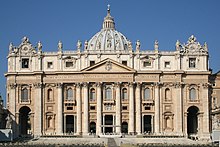Catholicism
Catholicism is a monotheistic, Trinitarian religion that acknowledges Jesus Christ as the Messiah. Its catechesis makes use of the Nicene Creed and the Apostles' Creed, which are accepted also by most major Christian denominations.

The Catholic Church is the world's oldest and largest continuously functioning international institution and the world's second largest religious body after Sunni Islam[1][2] According to the Pontifical Yearbook, the Church's worldwide recorded membership at 2017 was 1.313 billion, or 17.7% of the world's population.[3] This figure, although helpful in determining statistical information regarding the influence of the Catholic Church, most likely does not include lapsed Catholics or properly baptised Christians who are not in full communion with the Roman Pontiff. All properly baptised persons, even those not in complete communion with the Roman Pontiff, are members of the Church of Christ and may rightfully be called "Christians" and "brethren in Christ."[4] Baptism permanently makes one a Christian, cannot be undone, and never needs to be given a second time.[5] Although a person may enter into heresy or schism, or even completely reject Christianity and apostasize, the person will never be able to cease being a Christian. Although the Catholic Church may use penalties[6] and censures[7] to attempt to reform a person or minimize the harm a person can do, it does not have the power to revoke Baptism or expel a member from the Church.
The Church is headed by the Pope. He derives his authority through Apostolic Succession, as Peter was choosen to lead the Church.[8]
The primary statement of faith is the Nicene Creed and the Apostles' Creed.
The primary moral requirements are contained in the Two Great Commandments: complete love of God and the love of one's neighbor as one loves one's self. Some of the key facets of these two commandments are highlighted in the Ten Commandments.
Similarly to other Christian religions, Catholics view the Bible as a sacred text.
Beliefs
The core beliefs of the Catholic Church are shared by the majority of other Trinitarian Christian groups. Its catechesis makes use of the Nicene Creed and the Apostles' Creed, which are accepted also by most major Christian denominations. The Catechism of the Catholic Church (964 pages in the Latin edition) gives a rather detailed account of its beliefs. The Compendium of the Catechism of the Catholic Church, first published in 2005 and in English in 2006, is a much more concise version of the Catechism, in question and answer form.
Catholics place particular importance on the Church as an institution founded by Christ and kept from doctrinal error by the presence and guidance of the Holy Spirit, and as the font of salvation for humanity. The seven sacraments, which includes the Eucharist, "are 'powers that come forth' from the Body of Christ, which is ever-living and life-giving. They are the actions of the Holy Spirit at work in his Body, the Church. They are the 'masterworks of God' in the new and everlasting covenant" (from the Catechism of the Catholic Church, chapter 1116). The Catholic Church also places much importance on Baptism since the Church's interpretation of the Bible is that water baptism is necessary for salvation[9]
Footnotes
- ↑ Mark A. Noll. The New Shape of World Christianity (Downers Grove, IL: IVP Academic, 2009), 191.
- ↑ Religious Diversity and Children's Literature: Strategies and Resources, Sandra Brenneman Oldendorf - 2011, p 156
- ↑ "Presentation of the Pontifical Yearbook 2019 and the Annuarium Statisticum Ecclesiae 2017". Holy See Press Office. 6 March 2019. Archived from the original on 7 March 2019. Retrieved 6 March 2019.
- ↑ Catechism of the Catholic Church, §1271
- ↑ Catechism of the Catholic Church, §1272
- ↑ Code of Canon Law, Canons 1336-1338
- ↑ Code of Canon Law, Canons 1331-1335
- ↑ "Matthew 16:18". BibleHub. Online Parallel Bible Project. Retrieved 9 June 2019.
- ↑ http://www.catholic.com/library/Necessity_of_Baptism.asp